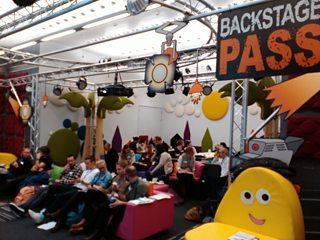I thought that I'd kick off this blog about the recent CBBC and CBeebies day with a bit of background about my journey to BBC Writersroom's Comedy Room in the hope of demonstrating that if you want a writing career, you have to be in it for the long term...
I have always wanted to write. As a teenager, the very first book I borrowed from the adult library was about writing a book (I was meta before that particular meaning was even invented!) When I was 16, I asked for a typewriter for my birthday (I still have it). I wrote poems and submitted them to various literary magazines. Why poems? Because they were short. I could easily knock off half a dozen before lunch. This was my introduction to the Rejection Slip. My interest in scriptwriting was sparked by “The Lloyds Bank National Screen-Writing Competition”. I started making notes and plans and writing bits of script but my spoof horror Freddie the Thirteenth remains unfinished to this day. A couple of years later, when I was at Uni in Scotland – and with my screenwriting ambitions on hold – I read a review of a newly released Scottish film called Restless Natives and learned that this was the script that had won the competition! The fact that an actual feature film had been made from a competition entry re-energised my screenwriting.

Kulvinder Gill
In my final year at Uni I got involved with writing a student sketch show and after graduating I started submitting sketches to production companies. I still recall the first sketch I ever sent off (it was to Spitting Image) a spoof horror film trailer for The Hammer House of Commons. Spitting Image passed – understandable, given that the title was the funniest bit of the sketch.
Around the same time I saw an ad in the Guardian for A Step Forward – a Comedy Writers’ Workshop sponsored by BBC TV and Lenny Henry. Yes, even as far back as 1989, Lenny Henry had spotted the under-representation of Black and Asian writers in TV and Radio and was working to change that. I submitted my sample script of five “typewritten” pages and many months later I was accepted and attended the weekend workshop with speakers including Richard Curtis and John Lloyd.
The day after the workshop, I started a new job in data processing and every evening I wrote sketches and submitted them to the BBC at the end of the week. This got me noticed and the following year I was hired as a commissioned writer on the first series of the sketch show The Real McCoy, which I did alongside my day job. I made a conscious decision to NOT give up the day job – and to continue writing in my spare time. And it was the right decision, because that first commission proved to be a false dawn. Real life got in the way – I had a demanding job plus a mortgage, so for the next 25 years, I worked in data processing (or data analytics as it became known in the trendier companies), whilst continuing to write when I could find the time.
You can’t carry on writing for a quarter of a century without having some sort of validation and I had my small successes which gave me hope. I wrote a half-hour children’s pilot which was under option at the BBC but never got made. I wrote a one-hour romantic comedy which was commissioned by the BBC but which also never got made. And then I wrote a two-page script which got made six times all over the world. I also found time to complete a two-year part-time MA in Television Scriptwriting at De Montfort University in Leicester – a course which sadly no longer exists – and the discipline imposed by having deadlines in those two years allowed me to build up a portfolio of seven scripts.
I continued to submit to the BBC Writersroom and made it to the shortlist several times, including the last CBBC competition in 2009 (the one where Debbie Moon pitched Wolfblood). Then in 2015, I decided to take a sabbatical from my number crunching career and concentrate on writing full-time – and so far, that has worked out. Last year I had a script longlisted in the Red Planet competition, this year I won my first ever writing competition – the IMDb Script to Screen Award – and got to make a film of my short script. Another script reached the semi-finals of the Academy Nicholl Fellowships and the same script was also shortlisted in Script Room 10 (2015) and I was invited in for an interview by the BBC Writersroom for the first time – but alas I didn’t make it into the Drama Room. I also advanced to the interview stage of the Felix Dexter Bursary and was shortlisted for the Comedy Room and this time – interview-wise – it was third-time lucky. This was particularly gratifying as my submission had been a solo-authored sketch show – featuring revised, polished and better executed versions of sketches I had originally written 25 years earlier. You live and learn.

The BBC Writersroom CBBC & CBeebies day
The BBC Writersroom Writing for Children's day
The Comedy Room started in September with a general introduction to both radio and television comedy with the second session in October dedicated to the TV Sitcom. The third session which took place earlier this month was the Children’s Day with CBBC and CBeebies in Salford – and was a joint session with both the Comedy and Drama Room writers together because CBBC and CBeebies output is so varied the session was applicable to both groups.
As preparation we were asked to watch a lot of the shows – and the enormous range of content did genuinely surprise me. Take, for example, CBBC – on the drama side, they have the contemporary The Dumping Ground, the costume drama Hetty Feather, the spooky anthology series Creeped Out – and at the comedy end, there is 4 O’Clock Club, Danger Mouse and Class Dismissed, which this week won a Children’s BAFTA.
I was also surprised by how much genuine depth and “heft” some of the children’s shows had – and that engaged me as an adult viewer. For example, The Dumping Ground dealt with serious issues – such as racism, homelessness and immigration. Similarly, the Marti episode of anthology series Creeped Out was like an episode of “Black Mirror for Kids” with its allegory about an abusive relationship with the smartphone AI taking the place of a coercive, gaslighting partner.

The Marti episode of CBBC show Creeped Out
We were also asked to prepare a short verbal pitch for a scripted show – drama, comedy or animation – that would resonate with children. I find pitching – or to be more specific, that pre-pitch period when you are waiting to pitch – to be quite stressful, so was thankful that this was scheduled early in the day. Fortunately, the process of pitching itself wasn’t that bad – it helped that this was quite informal and in small groups. The thing I noticed about verbal pitching, the longer and more detailed the initial pitch statement – the harder it was to follow the story. The best pitches seemed to be the simple ones – where the pitcher initiated an engaging, conversational Q&A with the pitchee.
CBBC has two main departments of interest to writers – In-house and Independent productions – but both want the same thing: scripts with great characters, good dialogue and a compelling story told with a fresh perspective or twist and an individual voice. And that’s exactly what all the mainstream channels – BBC and commercial – want. Writing for children is no different from writing for adults – apart from stricter editorial guidelines, with the risk of imitative behaviour being the main note of caution.
Watch former CBBC Drama Development Producer Laura Conway with top tips
A key difference with the children’s channels is that they look for – and commission – longer runs. CBBC look for scalability – story legs – they think several series ahead and can commission 13-episode series with story arcs that may run over 3 seasons. CBeebies commission even longer runs with series of 26 and 52 episodes.
CBBC doesn’t have an in-house animation department, so will always partner up with an animation production company. But if a writer has a great CBBC animation idea, then the preferred approach is to submit an 11-minute original animated script.
As well as CBBC and CBeebies channels, there are also writing opportunities on the various digital platforms – the channel websites, social media and YouTube. Most of the TV shows have digital spin-offs – that are driven by the parent show – and they all need writers. CBeebies even has its own online radio channel and it too needs writers.

4 O'Clock Club
We also heard from Connal Orton, the executive producer of the long running 4 O’Clock Club. Connal spoke about the importance of the development process to the success of 4 O’Clock Club. He urged writers to embrace the process – it is not a barrier – and it doesn’t matter if it takes a long time – indeed all the wrong turns will ultimately contribute to producing a better show. Connal spoke about breaking down and mapping the story first – a total of 17-18 beats across three A, B and C strands – and then developing the characters. He encouraged a writer to be a technician and crafts person and to hold off from writing dialogue.
Connal also offered the observation that although scripts need to put children out front, the adult characters also need to be complex and rounded – and he feels that sometimes the adult characters are not written well. Interestingly, when reading spec scripts from prospective writers, Connal will only read original scripts for adults.
The development process for all the shows seems to follow the same pattern – with notes to be incorporated and documents revised at each stage.
- Idea
- Premise
- Outline
- Scene-by-scene
- Script

Danger Mouse
With some of the shorter-length shows, for example, Danger Mouse, there are only three stages in the process, with the Idea and Premise combined and the Scene-by-Scene incorporated into a more detailed Outline.
With regards to comedy – the channels want compelling laugh-out-loud content – strong comedy that isn’t patronising. The advice was to write what you find funny rather than overthink and write what you think children will find funny. Alex Collier, a writer on Class Dismissed, says he writes to make the reader laugh. Alex also said that when writing for Danger Mouse, every line must reveal character, advance the plot or be a gag – at a minimum, it must do two of these things – ideally all three. Other advice for writers wanting to write for Class Dismissed included using catch-phrases a lot – the audience not only loves them but enjoys the wait for them. The producers look for physical comedy, gross comedy and embarrassing comedy – don’t worry about a sketch being “educational”.
If creating a new character for Class Dismissed keep in mind that the teacher has to be a real normal person but with larger than life quirks – and those personality traits have to have possibilities to turn into lots of sketches.
Next Ros Attille, the Head of Development at CBeebies gave a neat summary of her channel’s audience, Pre-schoolers:
- Have the best imagination – but limited vocabulary
- Love good stories but have limited experience.
- Love facts but have short attention span
- Love slapstick – but be wary of imitative behaviour
Ros also advised writers to write for the audience – not for their adults. So puns don’t work for younger audiences – or for global audiences. Ros also said that writers should put everything in – and not to worry about stepping on a director’s toes. There should never be a whole page of dialogue – there should always be plenty of action and description.
My Five Takeaways from the BBC Writersroom Children’s Day
- Watch CBBC and CBeebies. If you want to write for CBBC and CBeebies, you need to immerse yourself in their content.
- Realise that CBBC and CBeebies are more than just two channels – with the digital content on various platforms, plus CBeebies Radio, it is effectively a mini-network – and consequently there are more opportunities here – especially for a writer new to TV.
- The longer episode runs at CBBC and CBeebies means they are more likely to take a risk on a new writer.
- If you are a writer with any digital experience, there are opportunities for writing content for the online platforms
- The expansion of CBBC broadcasting hours to 9pm means the channel is now looking for ideas for 6-16 year-olds, with a particular focus on finding content for 13-16 year-olds.
Find out more about our Comedy Room and Drama Room development groups
Find out the dates for our upcoming open submission Drama Script Room
Read scripts including Children's scripts in our library
Watch interviews including Children's TV writer Joseph Lidster, Nathan Cockerill, Elly Brewer, Ben Ward & Paul Rose, Wolfblood creator Debbie Moon, Josh Weinstein (Strange Hill High, The Simpsons etc)
